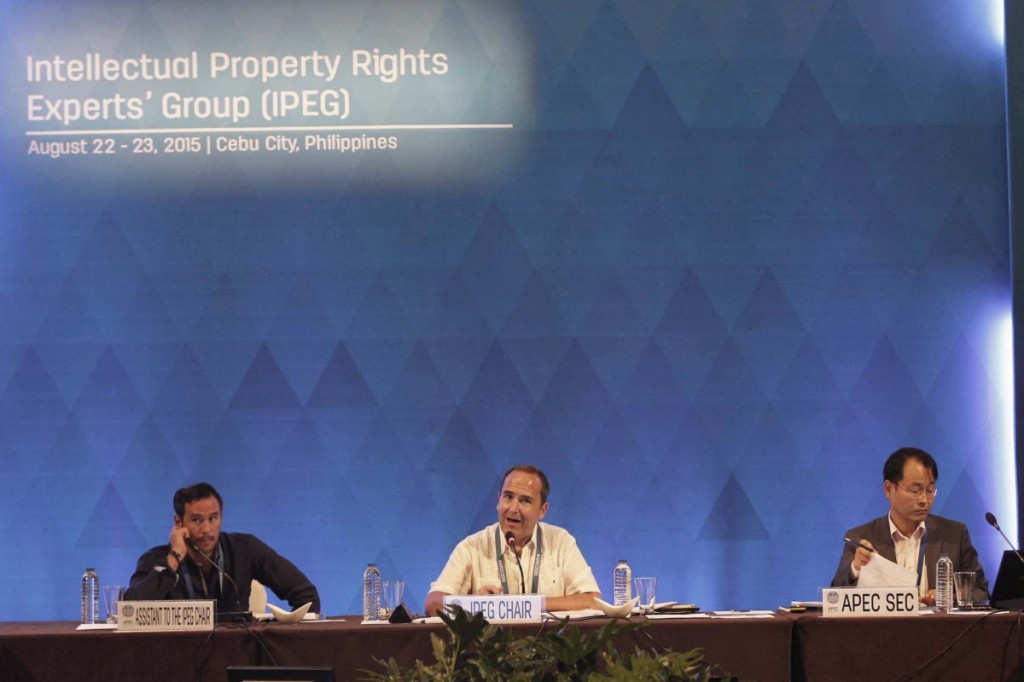With its expanding businesses and young and talented people, the potential of the country to become a premier innovation hub was displayed in abundance as it hosted the 2nd 2015 Asia Pacific Economic Cooperation Intellectual Property Experts’ Group Meeting (APEC-IPEG) in Cebu City.
The APEC-IPEG Meeting on 22-23 August 2015 was the final meeting hosted by the Philippines this year and one of the several APEC meetings in Cebu City. Over 40 IP experts and policy makers from 21 economies attended the meeting.
“I am thrilled to meet you this time in Cebu City, often called “The Queen City of the South” – capital to the Cebu Province and the oldest city in the Philippines. As the second city in the country, it is one of its main centers for commerce, trade, industry and education, which makes it a perfect venue for us to close IPEG’s Philippines cycle this year,” said Miguel ÁngelMargáin in his opening speech, the APEC-IPEG Chair and the Director General of the Mexican Institute of Industrial Property.
For his part, Atty. Allan B. Gepty, the head of the Philippine delegation to APEC-IPEG and the Deputy Director General and OIC Director General of the Intellectual Property Office of the Philippines (IPOPHL), said the Cebu meeting has solidified the policy efforts to promote inclusive economic growth and to facilitate the market expansion of micro, small and medium-sized establishments (MSMEs) through strengthened exploitation of their IP assets.
At the meeting, the Philippines pushed the adoption of its two proposals for MSMEs, one on “Brand Development for MSMEs” and the other one on “IP Valuation, Financing and Commercialization for MSMEs.”
“The Philippines is pleased to receive the overwhelming commitment and support from our partner economies at APEC for our agenda to strengthen MSMEs’ innovative capacities to improve their regional and global competitiveness through better appreciation and use of their IP assets,” added Mr. Gepty.
He noted that the Philippine agenda on MSMEs and inclusive growth were warmly received at the meeting.
Furthermore, the presentation by the Philippines on the recently launched IP Depot of the IPOPHL, and online marketplace, was lauded and was found to be aligned with similar IP marketplace projects in other APEC economies such as Hong Kong, Taiwan, and South Korea.
The legal reform on IP Enforcement instituted by the IPOPHL, which gave enforcement mandate to the IP Office, also caught the attention of foreign delegates.
The United States described the Philippine IP enforcement efforts as “creative and energetic” and noted that it received positive reports from the American businesses in the Philippines – a measure of the progress of IP protection and enforcement in the country.
An illustration of an innovative endeavor in Cebu City is the Mango Waste Bio Refinery Plant of a start-up company of the University of San Carlos.
The APEC-IPEG delegates visited the plant and were impressed with its success story.
The venture has been successful in creating a thriving and eco-friendly business venture out of its IP assets.
The plant converts dried mango wastes into mango flour and other ingredients such as pectin and polyphenol for the food, pharmaceutical and cosmetic industries.
The APEC-IPEG delegates were also introduced to the highly successful IP youth education program of the IPOPHL called the IP Youth Camp.
A camp for selected students from science and technology and private secondary schools in Metro Manila and Cebu province.
The students took their oath as Young IP Advocates before the delegates.
Other activities on the sidelines of the APEC-IPEG meeting in Cebu City were the signing of an expanded Memorandum of Understanding (MoU) for IP cooperation between the Philippines and Mexico and the Workshop on Trade Secret Protection hosted by the US. – BusinessNewsAsia.com
